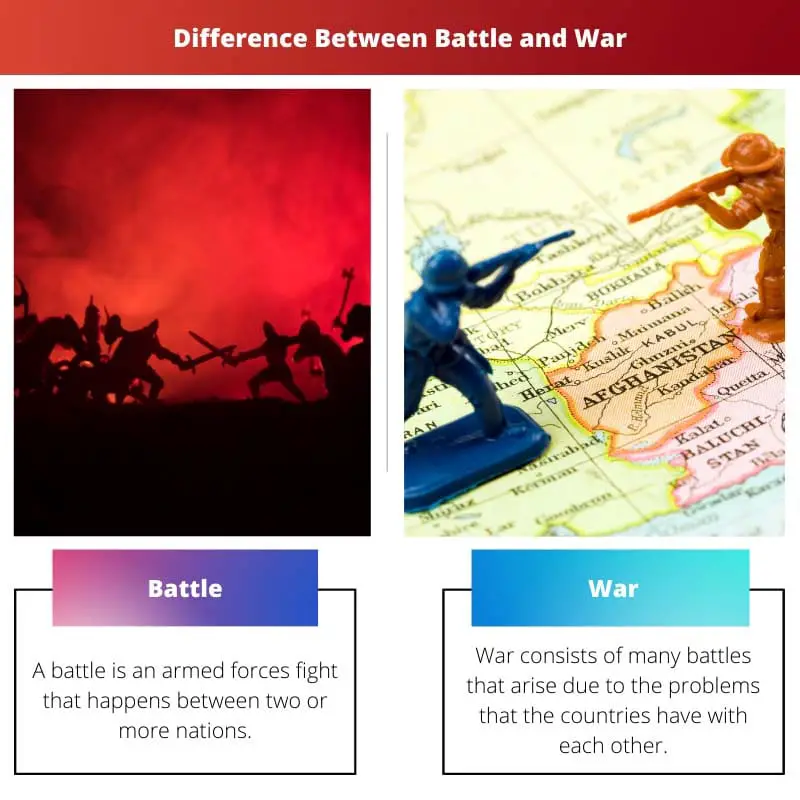Conflicts and disagreements between nations and governments lead to warfare. Warfare is one of the methods to solve the ongoing issue while negotiation fails.
In this context of nations’ tussle, there are two important terms that we come across. One is Battle, and the other is War. Though both seem to sound and mean similar, there are significant differences between the two.
Key Takeaways
- Battles constitute individual engagements within a larger war, whereas wars encompass multiple battles and involve long-term conflicts between nations or groups.
- Battles tend to be shorter and focused on specific locations, while wars involve various geographical regions and can span years or even decades.
- The scale of warfare is much larger than individual battles, as wars require extensive planning, resources, and the coordination of numerous forces.
Battle vs War
The difference between Battle and War is that battle is the operational mobility of warfare, while War is the conflict or a disagreement between two countries or two military forces of the countries. A battle is an actual attack, while War is the underlying reason.

An occurrence of a fight between two opposite military units is called a battle. The size and number of the opposing units do not matter in this aspect. Incidentally, a battle is an engagement for the military units with a specific duration and time.
The battle has decisive results.
War, on the other hand, is a strong conflict between two countries that leads to disagreements between the two. This issue shall be taken to talks for several sittings, and if not resolved, the countries might resort to fighting battles with armed forces.
Incidentally, War requires strategies, and one of the best war strategists of all time is Sir. Winston Churchill.
Comparison Table
| Parameters of Comparison | Battle | War |
|---|---|---|
| Definition | A battle is an armed forces fight that happens between two or more nations. The resources used for the battle is limited compared to war. | War consists of many battles that arise due to the problems that the countries have with each other. This requires a lot of resources that shall be deployed at several locations to fight the battle if it arises. |
| Duration | The battle is fought for a shorter duration. | War is an ongoing problem and is longer in duration. |
| Strategies | It focuses on strategies made to capture the vantage areas of the enemy, strategies based on the place they fight with each other and so on. | War has different strategies altogether. It is not an on-field strategy while its focus on eliminating the leaders, sometimes lose the battle to win the war. |
| Result – Loss | A loss in a battle does not necessarily mean that the war is lost. The a.rmy can come back again to attack. | A loss in the war is a territory surrender to the opposite nation. |
| Location | The battle is fought in just one location. | War has many locations and may have multiple battles at a time. |
What is Battle?
The battle is an execution procedure to fight or attack the enemy country if the disagreement falls into the warfare category. It is the armed forces’ aggression towards the enemy nation while they defend themselves and attack the enemy simultaneously.
Battle happens for a relatively shorter duration with minimal resources compared to War. It has a specific duration and commitment. The military units shall fight against each other at a particular location. A few examples of Battles are
- Battle of Britain
- Battle of Stalingrad
- Battle of the Mediterranean
The military personnel involved in such battles are relatively smaller in size. The battle has several strategies to be made in terms of resources, manpower, and equipment. Many battles are fought to win a war.
A loss in the battle does not guarantee any loss in the War. At the same time, the number of casualties lost in a battle shall be relatively less compared to the entire war scenario.
Three types of battles can happen.
- Land
- Naval
- Aerial
As it is pretty evident what the mode of battle will be. But the mode of battle is a part of the strategy too. The combination of the types of battle shall ensure victory too.

What is War?
War is an ongoing problem between two countries that have not reached any agreement and may lead to battles. A combination of battles is the War. War is relatively larger in territory and resources.
War shall happen in multiple locations as the military units shall deploy the soldiers with the required resources at various locations to defend and attack if a battle arises.
More importantly, the strategies used in War are way too different from battles. The strategies include depleting the company with resources from external sources, eliminating the country’s main leaders and so on.
There are many ongoing wars, even in the current era. War shall go on for years.
The amount of resources and combatants used in War is more. At the same time, the casualty count shall also be more. War leads to massive deaths of civilians as well.
The intense disagreement or conflict between the nations shall also resort to peace talks during the War.
The efforts taken during the War were meticulous as the countries also deployed special teams as a backup for the battle. Examples of wars are World War I and II. As we know, when the world wars happened, battles were happening simultaneously in many locations. A win in the War means occupying a territory. Modern war techniques and strategies allow the countries to dominate the opposing nation and exploit their resources too.

Main Differences Between Battle and War
- The main difference between Battle and War is that battle is an armed force literal fight while War is the conflict that is the cause for the battle.
- While the battle is of a smaller duration, the war duration is relatively longer.
- The strategies used in battle are on the fighting methods and resources, while that of the War is to work on resource depletion, capturing the main leaders, and so on.
- The battle is fought in one location, while War has multiple locations to battle it on.
- The resources used in a battle are fairly less compared to the war scenario on the whole.

- https://books.google.co.in/books?hl=en&lr=&id=zBhG3PLN6IQC&oi=fnd&pg=PT5&dq=what+is+a+battle+and+a+war&ots=GBVS1daOvR&sig=KkoxIjVrZyQBzOqcj4SW7Ln6_Jc&redir_esc=y#v=onepage&q=what%20is%20a%20battle%20and%20a%20war&f=false
- https://books.google.co.in/books?hl=en&lr=&id=N3mEH3ozXL0C&oi=fnd&pg=PT6&dq=what+is+a+battle+and+a+war&ots=pwtehlxbub&sig=I-oj6wenoguyop5V3J3MnNkA02o&redir_esc=y#v=onepage&q=what%20is%20a%20battle%20and%20a%20war&f=false

This article provided a comprehensive explanation of the differences between battles and wars, shedding light on the complexity of military engagements.
I agree with your assessment. The examples of battles provided also add historical context to the discussion.
The analysis of battles and wars as distinct forms of military engagement is presented with clarity, offering valuable insights into the nature of armed conflicts.
The explanation of the differences between land, naval, and aerial battles adds depth to the examination of military strategies and tactics.
The detailed explanation of the characteristics of battles and wars offers a comprehensive analysis of military engagements, highlighting the complexity of such conflicts.
The distinction between battles fought in a single location and the multi-location nature of wars provides a clear distinction between the two forms of armed conflict.
The discussion of the types of battles and their strategic significance enhances the understanding of military tactics and operations.
The examples of battles and the explanation of the territorial scope of wars contribute to a nuanced understanding of the concepts discussed in the article.
The consideration of location and scale in battles and wars provides valuable insights into the operational aspects of military conflicts.
The reference to historical figures such as Sir Winston Churchill adds historical context to the examination of warfare strategies.
The article effectively highlights the differences in the duration, strategies, and outcomes of battles and wars, offering a comprehensive analysis of military conflicts.
The detailed comparison of the territorial and resource aspects of wars provides valuable insights into the multifaceted nature of large-scale armed conflicts.
The focus on the significance of a loss in battle versus a loss in war contributes to an in-depth understanding of the broader implications of military engagements.
The distinction between battles and wars is clearly articulated, emphasizing the strategic and geopolitical factors at play in both forms of military engagement.
The discussion of the impact of battle and war outcomes on subsequent military actions adds depth to the analysis presented in the article.
The comparison table effectively summarizes the distinctions between battles and wars, helping to clarify the key points made in the article.
I appreciate the emphasis on the duration and scale of warfare, providing a detailed analysis of the differences in scope between battles and wars.
The focus on strategies in battles and wars highlights the importance of planning and resource allocation in military conflicts.
The examination of battles and wars as distinct forms of military conflict offers a comprehensive overview of the operational, strategic, and geopolitical factors involved in armed engagements.
The comparison table effectively summarizes the essential differences between battles and wars, providing a clear framework for understanding each form of armed conflict.
The detailed analysis of battles and wars provides an insightful exploration of the complexity of military engagements, enhancing the reader’s understanding of the nuances of armed conflicts.
The focus on the duration and scale of battles and wars contributes to a nuanced examination of the varying nature of military engagements in different contexts.
The detailed comparison between battles and wars provides a thorough understanding of the operational and strategic dimensions of military conflicts, enriching the reader’s knowledge on the topic.
The emphasis on the duration and ongoing nature of wars contributes to a comprehensive examination of the long-term impact of military engagements.